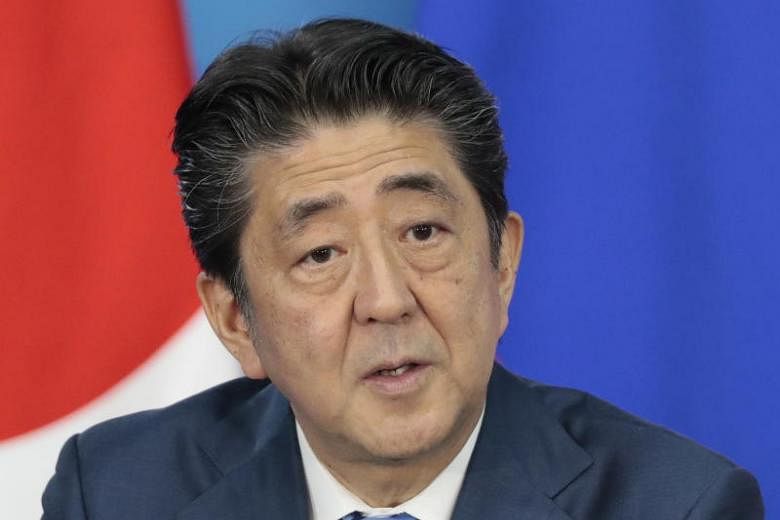TOKYO - Japanese Prime Minister Shinzo Abe on Monday (Sept 10) repeated his vow to revise the Constitution to clear up any doubts over the legality of the Self-Defence Force (SDF), were he to win another three years at the helm of the Liberal Democratic Party (LDP).
He also pledged to go ahead with a planned consumption tax hike to 10 per cent from 8 per cent in October next year, which has already put off twice since the last increase in 2014 triggered a recession.
This is so as to fund social security policies while the government pursues efforts to achieve a primary balance surplus by fiscal 2021.
Mr Abe, 63, was delivering his first policy speech to LDP lawmakers in the run-up to a party election on Sept 20 to decide who will lead the party for the next three years.
He is vying with former defence chief Shigeru Ishiba, 61, for the top post. As the LDP is the ruling party, its president is de facto prime minister.
Mr Abe, who has been premier since December 2012, has consolidated power within the LDP to such an extent that political observers expect him to easily coast to victory, adding that anything less than a landslide could render him a lame duck.
A historic win - LDP rules were rewritten last year to allow three consecutive three-year terms, up from a previous limit of two - will put Mr Abe in charge of the world's third-largest economy until 2021.
"This presidential election is the last for me," he said on Monday, as he effectively put an end date to his tenure while laying out his plans for the next three years.
He also vowed to right the ship as his government has been bruised by allegations of cronyism and corruption. Of late, ministries have been found to have padded employment data of the disabled.
Both Mr Abe and Mr Ishiba squared off on the Constitution on Monday, with Mr Abe arguing that it was high time to bring the 71-year-old charter up to date to "create an environment where the SDF personnel can proudly fulfill their duties".
Japan's pacifist Constitution, drafted by the United States after World War II, stipulates that armed forces will "never be maintained". But this has been reinterpreted to allow a military for self-defence purposes, with the SDF effectively stuck in a constitutional grey zone.
Mr Abe, who said the LDP will table its proposals to Parliament by the end of this year, wants to explicitly codify in the law that the SDF "protects the peace and independence of Japan". But Mr Ishiba argued that this change was unnecessary as "hardly anyone in Japan doubts its constitutionality".
The two men also sparred over the economy, and the track record of the Abenomics mix of economic policies. Mr Abe was buoyed by data on Monday that Japan's economy grew 3 per cent in the second quarter - the fastest pace since early 2016.
The premier said that Japan, after decades of a moribund economy, was gripped by pessimism and resignation over its future when he took over. But he has since overseen the creation of 2.5 million jobs, while the economy expanded by 12.2 per cent despite the working population declining by 4.5 million people.
Mr Ishiba, who was LDP secretary-general from 2012 to 2014 and served as regional revitalisation minister from 2014 to 2016, however, questioned how much of this economic benefit can actually be felt by the average person, whose disposable income is falling.
Separately, Mr Abe noted Japan's growing international clout on such issues as free trade and the rule of law, and said that he was the best man to build on his country's warming ties with China and Russia, and to engage North Korean leader Kim Jong Un to win the return of the Japanese citizens who are said to have been abducted by Pyongyang decades ago.
On Monday, Mr Abe met South Korean spy chief Suh Hoon, who is the presidential envoy to North Korea, and said that Tokyo and Pyongyang should launch talks in conjunction with an ongoing dialogue with North Korea by Washington and Seoul.
The prime minister is now in the Russian city of Vladivostok for the Eastern Economic Forum, where he met Russian President Vladimir Putin on Monday and is set to meet Chinese President Xi Jinping on Wednesday.
According to a Kyodo News poll at the weekend, 61 per cent of LDP members intend to vote for Mr Abe while 28.6 per cent plan to cast their ballot for Mr Ishiba.


